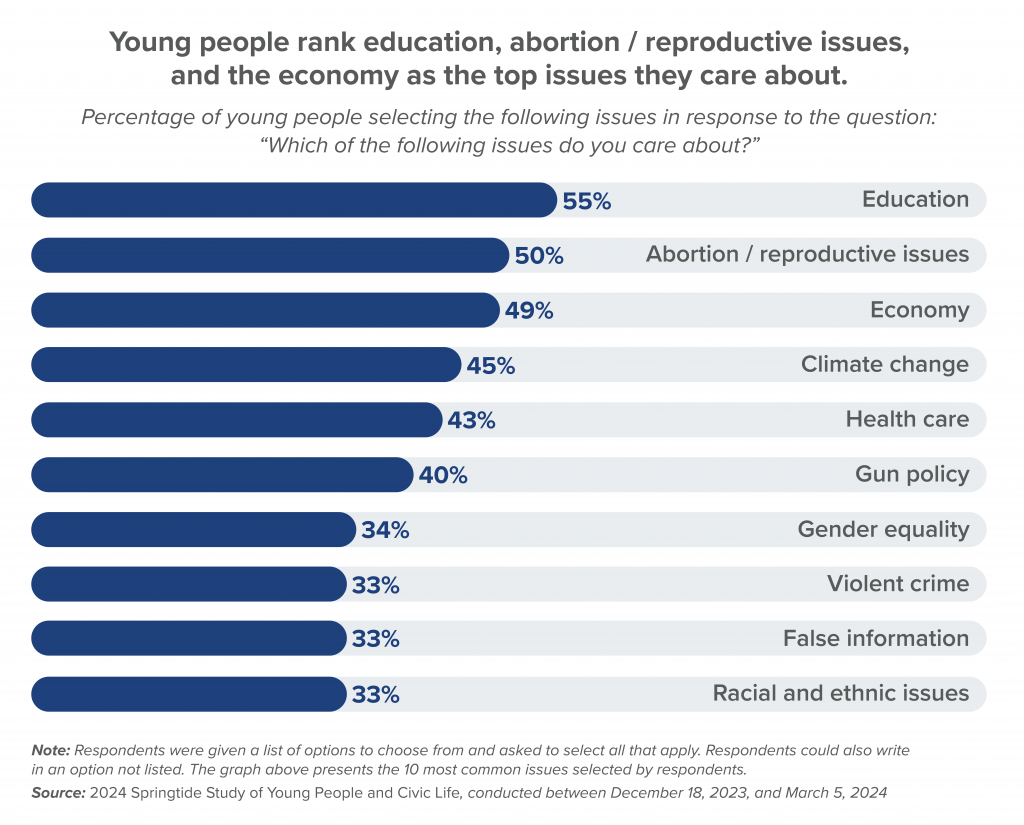
“It’s kind of a personal thing to me”: Young People and Issues That Resonate
Our newest report, Cultivating Care: How & Why Young People Participate in Civic Life, explores young people’s civic lives in the context of care—how they seek and gain knowledge, detangle complex identities from narrow labels, and engage in dialogue and action in ways that feel safe and productive. This post is the first in a series that showcases our latest findings, many of which are excerpted directly from the report. Read more about Cultivating Care here.
The economy, gun control, reproductive rights, foreign policy—conversations about social issues dominate the current political arena. Some adults assume young people are apathetic or disengaged, yet many of them have strong opinions on these issues. In some instances, young people’s contributions to these conversations have shifted how society at large now views those issues.
At Springtide, we asked thousands of young Americans ages 13 to 25 what social and political issues they care about, what motivates them to care, and what propels them to action. What they shared not only shines a light on their perceptions of political issues but also has led us to a better understanding of how to care.
Caring about Social Issues
Springtide data show that many young people may be disillusioned with the US political system. Some may not identify with a political party or even view politics as highly important in their lives. Yet, our findings show that young people are tuned into political and social issues.
Young people report caring about education (55%), abortion / reproductive issues (50%), the economy (49%), climate change (45%), health care (43%), and gun policy (40%). Just 6% of young people report not caring about any political issues.

- Interview and survey data show five central influences on young people’s civic care. Relationships with family and friends powerfully shape young people’s care for social issues. Relationships give otherwise abstract issues a human face, one that young people already know and love. David, 17, says that his care for reforming the immigration system stems from caring for his immigrant mother: “It’s kind of a personal thing to me, ’cause my mom is an immigrant. I haven’t experienced it, but [from] what she’s told me, it sounds like it’s pretty rough going from one country to another.” As a result of his mother’s story, David is in favor of “keeping [immigration] strict” but helping “people who really, genuinely need to come to the US for better living conditions.
- Some young people come to care through firsthand experience. Olivia, 20, shares that she didn’t think much about the environment as a child, but once in middle school she started to experience strange weather patterns. She says: “things like that . . . started to impact our daily lives—where it’d be like, okay, why is it 60 degrees in February? Like, that’s not right.”
- Young people’s social contexts (like school or a job) and communities (like a church or an affinity group) also pave the way to caring about a given social issue. Noah, 15, says that ahead of the 2020 presidential election, his middle school history teacher created an assignment around “keep[ing] updated with current events.” This led Noah to watch the Republican debates, where one candidate spoke about the opioid crisis. Though he still does not identify as a political person, Noah counts the opioid crisis among the issues he cares about.
For Yejin, 24, who grew up in South Korea, it was college experiences that led her to question her long-held beliefs about abortion. By becoming friends with people who were taking premed classes, Yejin learned about new perspectives on reproductive health that led her to change her views and join an activist organization.
As an elementary school behavioral specialist, Jake, 25, feels impacted by having to help young children practice active shooter drills. “I don’t know what’s freakier—the [kiddos] that are so used to it and aren’t affected by our drills, or the ones that are sitting there bawling their eyes out. Like, both sides of the coin are sad and scary.” While Jake says he is “a full supporter of the Second Amendment,” his work experiences have led him to favor mental health checks as part of a full background report. - Political events themselves—policy changes, elections, or widely covered news stories—can also bring social issues onto young people’s caring radar. Some respondents recall how the election of Donald Trump led them to start caring about issues like immigration (Lisa, 21), racism (Marisol, 19), foreign policy (Caden, 18), and local politics (J.J., 19). The Israel-Hamas conflict produced moral outrage in young people like Camila (23) and Michelle (24), who scrolled social media posts about the conflict as it unfolded.
- News and social media coverage of events draws awareness to social issues, making those issues seem worthy of attention and care. Ethan, 25, shares that most of the things he sees about political events are online: “I can get online right now and see something about either somebody that’s the president, [or] a governor or mayor did this or did that. And if I didn’t have social media, maybe I might not know they committed a crime or they did something underhanded. But now I do; I have access to everything people are saying and doing.”
Learn more about young people’s political identities and beliefs in our newest report, Cultivating Care: How & Why Young People Participate in Civic Life.



